
Top 18 Ecommerce Helpdesk Software for Exceptional Customer Support
- Trendinsaas
- No Comments
Choosing the right customer support software and ecommerce helpdesk software is crucial for delivering seamless and efficient customer support. Leading solutions like Zendesk, Freshdesk, Gorgias, Re:amaze, and Help Scout provide businesses with powerful features such as automated ticketing, AI-driven chatbots, multi-channel support, and real-time analytics. These tools help streamline customer interactions, reduce response times, and enhance overall customer satisfaction. With integrations for popular ecommerce platforms like Shopify, WooCommerce, and Magento, they enable businesses to manage customer inquiries effectively and boost retention rates. Investing in a top-tier helpdesk solution ensures a smooth customer experience, ultimately driving loyalty and long-term business growth.
What is Ecommerce Helpdesk Software
Ecommerce helpdesk software is a customer support tool designed to streamline and manage customer interactions across multiple channels, such as email, live chat, social media, and phone. It enables businesses to provide timely, efficient, and personalized support, ensuring a seamless shopping experience for customers. By centralizing support tickets, automating responses, and integrating with ecommerce platforms, helpdesk software enhances team productivity and reduces response times. This software is essential for improving customer satisfaction, resolving issues effectively, and building long-term customer loyalty. In a competitive ecommerce landscape, investing in a robust desk solution can significantly impact a brand’s reputation and customer retention.
Benefits of using ecommerce helpdesk software for customer support and customer satisfaction
- Improves customer satisfaction and loyalty through efficient support.
- Enhances team collaboration and communication with desk tools.
- Provides better issue tracking and resolution with desk software.
- Increases efficiency and productivity with automated workflows and quick responses.
- Offers personalized customer support through AI-powered chatbots and virtual assistance.
- Evaluates and enhances support team performance by tracking metrics such as ticket inflow, response time, and resolution time.
Choosing the Right Ecommerce Helpdesk Software
Selecting the right eCommerce helpdesk software is crucial for enhancing customer support and streamlining everyday operations. The best software provides workflow automation, reduces manual data entry, and supports multiple users for efficient team collaboration. Look for features like predictive analytics, customer data tracking, and third-party app integrations to improve response times and overall service quality. Whether you need a free plan or a comprehensive suite of tools, choosing software that aligns with your business requirements can help you save time and boost customer satisfaction.
Identify your specific needs and goals for ecommerce support
- Determine the type of support channels you need (email, chat, phone, social media).
- Identify the features you require (ticket management, reporting, automation).
- Consider the size of your customer service team and the volume of support requests.
Evaluate the features, functionality, and ticket management of ecommerce helpdesk software
- Look for features like ticketing system, issue tracking, automated workflows, and reporting features.
- Evaluate the user interface and user experience of the software.
- Check for integrations with other tools and platforms (CRM, email marketing, etc.).
Assess user-friendliness, scalability, and support team performance of ecommerce helpdesk software
- Ensure the software is easy to use and navigate for support agents.
- Check if the software can scale with your business growth and increasing support requests.
- Evaluate the software’s ability to handle multiple support channels and customer conversations.
Consider cost and return on investment (ROI) of ecommerce helpdesk software
- Evaluate the pricing plans and costs of the software.
- Consider the potential ROI of the software in terms of improved customer satisfaction and increased efficiency.
- Check for any additional costs or fees for features or integrations.
Top 18 Ecommerce Helpdesk Software Options
Zendesk for Service
Zendesk offers a comprehensive suite of features designed to enhance ecommerce customer service, making it a top desk tool for businesses. Its messaging and live chat functionality enables real-time interactions with customers, ensuring quick query resolution. AI and automation streamline workflows by handling routine inquiries, allowing agents to focus on complex issues. With data privacy and protection, businesses can safeguard customer information, ensuring compliance with regulations. The help center feature empowers customers with self-service options, reducing the need for direct support. Additionally, the agent workspace provides a centralized hub for managing customer interactions across multiple channels, including voice support for seamless communication. Zendesk also offers workforce engagement tools to optimize team performance and ensure high-quality service delivery.
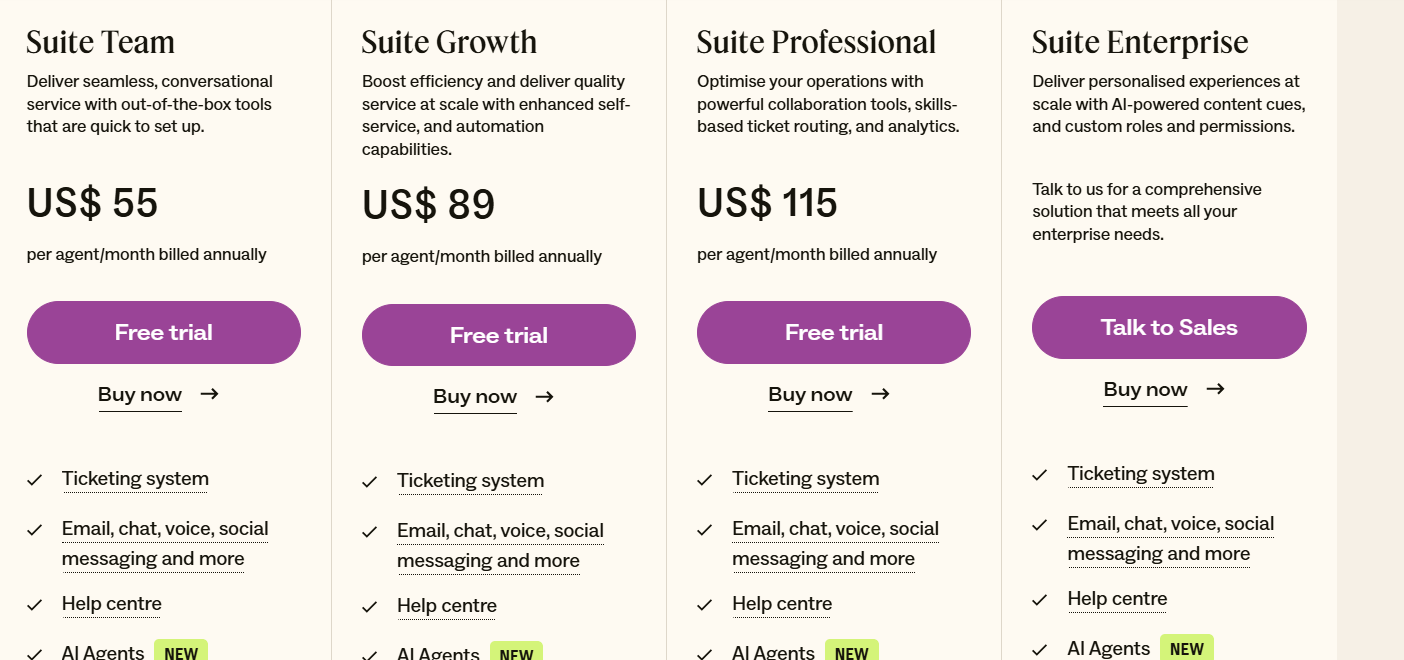
When it comes to pricing, Zendesk provides flexible plans tailored to various business needs. The Support Team plan, priced at $19 per agent per month (billed annually), consolidates customer issues, offers conversation history, and includes out-of-the-box reporting. The Support Professional plan, at $55 per agent per month (billed annually), enhances customer satisfaction with automated feedback, multilingual support, and service level agreements (SLA). For large-scale businesses, the Support Enterprise plan, priced at $115 per agent per month (billed annually), includes advanced features such as skills-based routing, custom agent roles, contextual workspaces, and sandbox environments. Each plan comes with a free trial, allowing businesses to explore Zendesk’s capabilities before making a commitment.
Help Scout
Help Scout is a powerful ecommerce helpdesk solution designed to empower customer support teams with seamless communication and workflow management. Its Inbox feature consolidates all customer interactions across multiple channels, ensuring no query goes unanswered. The platform supports Apps & Integrations, enabling businesses to connect with third-party tools like Salesforce, Jira, and HubSpot for enhanced productivity. Insights & Analytics provide deep data-driven reports, helping businesses track performance and optimize customer interactions. Help Scout also focuses on customer empowerment with Self-Service options, allowing users to find solutions without direct assistance. The newly introduced Proactive Messaging feature enhances engagement by enabling businesses to reach out to customers before issues arise.

Help Scout offers a flexible pricing model based on the number of contacts rather than per-agent fees, making it a cost-effective solution for growing businesses. The Free plan, at $0, supports up to 50 contacts per month with unlimited users and includes essential features like an inbox, AI-powered help widgets, and basic reporting. The Standard plan costs $50 per month, starting with 100 contacts per month, and includes advanced functionalities like multiple inboxes, API access, integrations, and customer satisfaction ratings. The Plus plan, priced at $75 per month, offers premium features such as Salesforce and Jira integrations, custom fields, advanced permissions, and workflow automation. With no additional fees for AI usage or extra agents, Help Scout ensures businesses only pay for the support they provide, making it a scalable and customer-friendly helpdesk solution.
Intercom
Intercom is a cutting-edge AI-first customer service platform designed to streamline support operations with automation and intelligent interactions. At its core, the Fin AI Agent acts as a human-quality AI assistant that can resolve customer queries across multiple channels, including email, chat, SMS, and social media. This AI agent learns instantly from support content, ensuring accurate and context-aware responses. Intercom also provides a shared inbox and ticketing system for better collaboration, customizable messaging options, and an intuitive setup that takes less than an hour. Additional features such as workflows automation, multilingual help centers, and security-focused solutions make it an excellent choice for businesses looking to enhance customer experience while reducing manual workload.
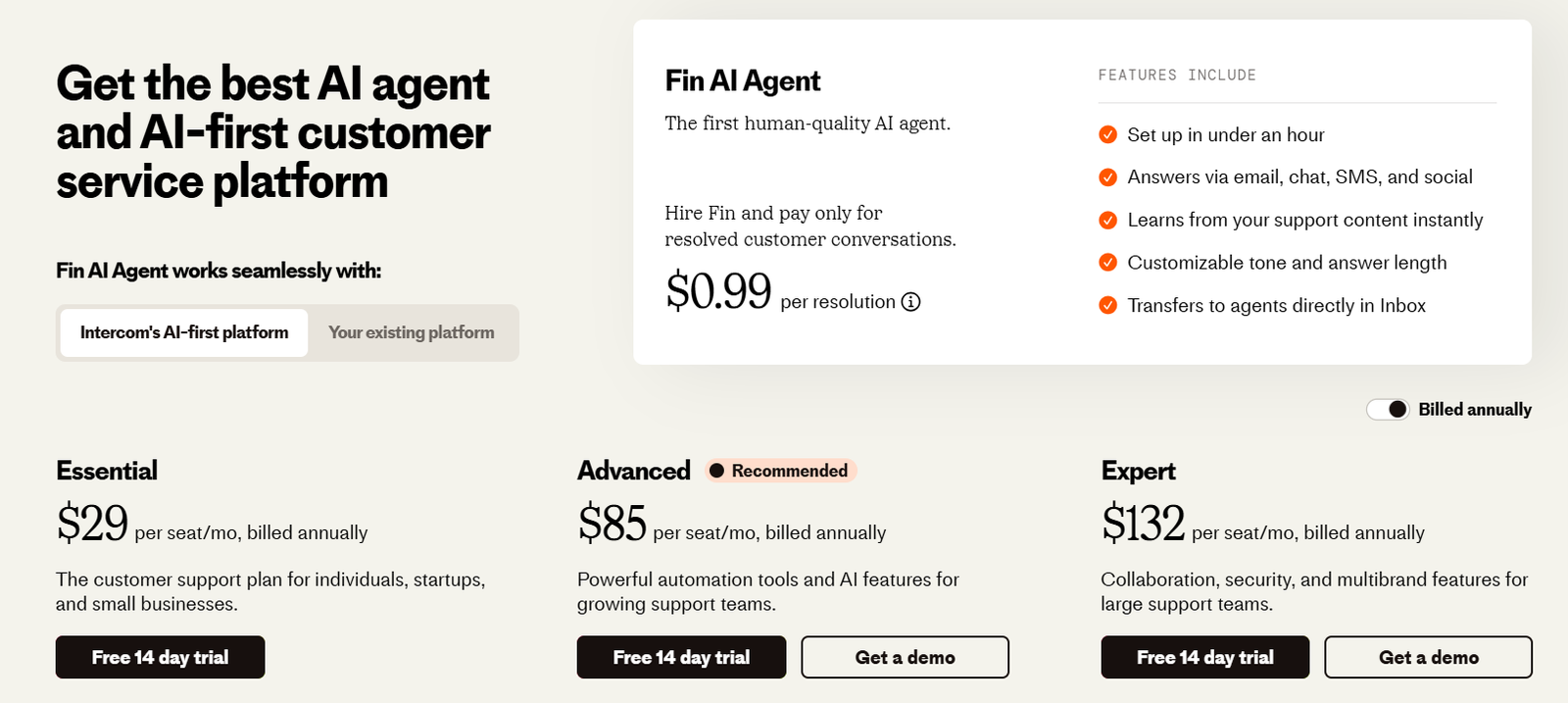
Intercom’s pricing is structured to cater to businesses of all sizes. The Fin AI Agent operates on a pay-per-resolution model at $0.99 per resolved conversation. The Essential plan, priced at $29 per seat/month (billed annually), is ideal for startups and small businesses, offering core features like a shared inbox, messenger, and public help center. The Advanced plan, at $85 per seat/month, includes additional automation tools, workflow builders, and multilingual support. For larger enterprises, the Expert plan costs $132 per seat/month and provides advanced security features, HIPAA compliance, SSO & identity management, and multibrand support. Each plan comes with a 14-day free trial, making it easy for businesses to explore Intercom’s capabilities before committing.
Zoho Desk software
Zoho Desk is a feature-rich helpdesk software designed to streamline customer support for businesses of all sizes. It offers essential tools like email ticketing, social media integration, and web forms to manage customer queries efficiently. Advanced features such as live chat, knowledge base, AI-powered automation, and community forums enhance customer engagement and self-service options. The ASAP self-service widget allows businesses to provide instant solutions, while the multi-level escalations and custom reports ensure a seamless support experience. Higher-tier plans include telephony, multilingual help centers, skill-based ticket assignments, and AI-driven assistance through Zoho’s Zia AI, making it a robust platform for companies looking to scale their support operations.
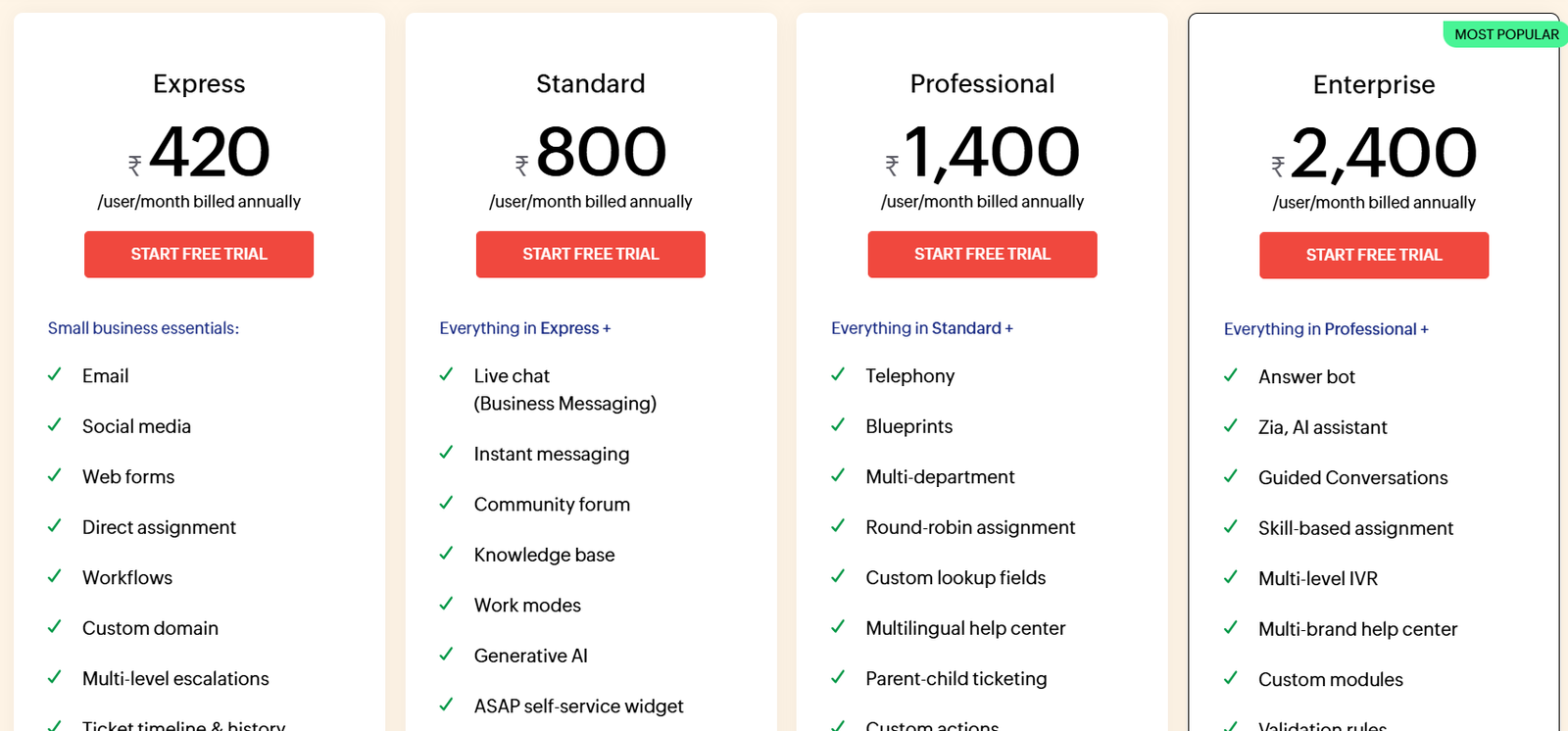
Zoho Desk offers a flexible pricing structure with multiple plans. The Express plan starts at ₹420/user/month (billed annually) and includes basic support features. The Standard plan, priced at ₹800/user/month, introduces live chat, instant messaging, and advanced analytics. For more extensive operations, the Professional plan at ₹1,400/user/month adds telephony, multi-department support, and custom automation. The Enterprise plan, priced at ₹2,400/user/month, includes premium features like AI-driven answer bots, multi-brand help centers, and guided conversations. Businesses can also opt for the Zoho Desk Free Edition, which provides basic email ticketing for up to three users, making it an excellent starting point for small teams.
Freshdesk
Freshdesk is a powerful customer service platform designed to enhance support operations with AI-powered ticketing and automation. It offers a shared inbox, multilingual conversations, customer portals, and self-service options to streamline customer interactions. Advanced features include collaborators for team efficiency, Freddy AI for intelligent ticket management, and automation for routing and SLA management. Businesses can also leverage analytics and insights tools to track customer service performance, ensuring data-driven decision-making. Freshdesk seamlessly integrates with Freshchat and Freshcaller, providing a complete omnichannel support experience for ecommerce brands.
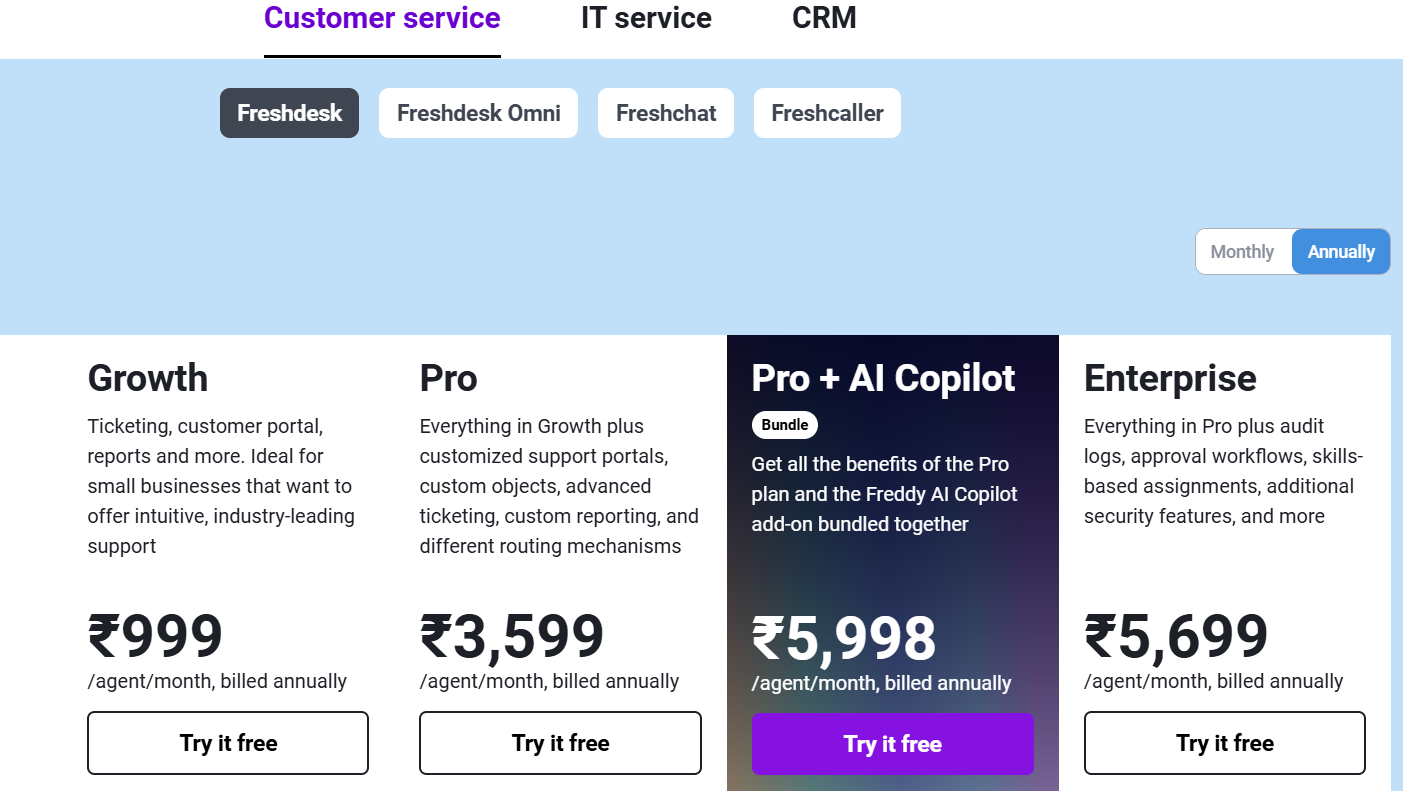
Freshdesk’s pricing plans cater to different business sizes. The Growth plan starts at ₹999/agent/month (billed annually) and covers essential ticketing features. The Pro plan at ₹3,599/agent/month includes collaborators, multilingual support, and AI-driven insights. The Pro + AI Copilot bundle costs ₹5,998/agent/month, offering Freddy AI Copilot for automated assistance. The Enterprise plan, priced at ₹5,699/agent/month, adds high-level security, routing, and advanced AI features. Businesses can also opt for the Free plan, which supports up to two agents with basic ticketing and reporting, making it an excellent choice for small teams.
Re:amaze
Re:amaze is a comprehensive customer support platform designed for ecommerce businesses of all sizes. It offers unlimited email inboxes, live chat, social media integrations, workflow automation, response templates, and chatbots to streamline customer interactions. Businesses can use Cues for proactive messaging, public/internal FAQs for self-service, and customer intent detection to improve engagement. Advanced features in higher-tier plans include managing multiple brands, real-time website visitor monitoring, SMS and voice support, custom email designs, and status pages. With a focus on collaboration, Re:amaze provides live screensharing, staff performance tracking, customizable roles, and in-chat video calls to optimize customer support efficiency.

Re:amaze’s pricing is structured to accommodate different business needs. The Basic plan costs $29 per team member/month, offering essential tools like live chat and automation. The Pro plan, priced at $49 per team member/month, adds advanced reporting, SMS & voice channels, and custom domains. The Plus plan, at $69 per team member/month, introduces staff management, performance analytics, in-chat video calls, and customizable roles. All plans come with a free trial, no contracts, and annual billing discounts, making Re:amaze a flexible and cost-effective choice for ecommerce support teams.
HubSpot Service Hub
HubSpot Services Hub is a powerful ecommerce helpdesk software designed to streamline customer support, automate interactions, and drive growth. It provides an omnichannel support system, allowing businesses to manage customer inquiries through email, live chat, social media, and phone calls from a single platform. Features like automated ticket routing, custom workflows, and knowledge base management ensure quick and efficient responses. The software also integrates with HubSpot’s CRM and marketing tools, enabling businesses to track leads, personalize communication, and improve customer satisfaction. With AI-powered insights, dynamic personalization, and multi-touch revenue attribution, HubSpot Services Hub helps ecommerce brands deliver seamless, data-driven customer support experiences.
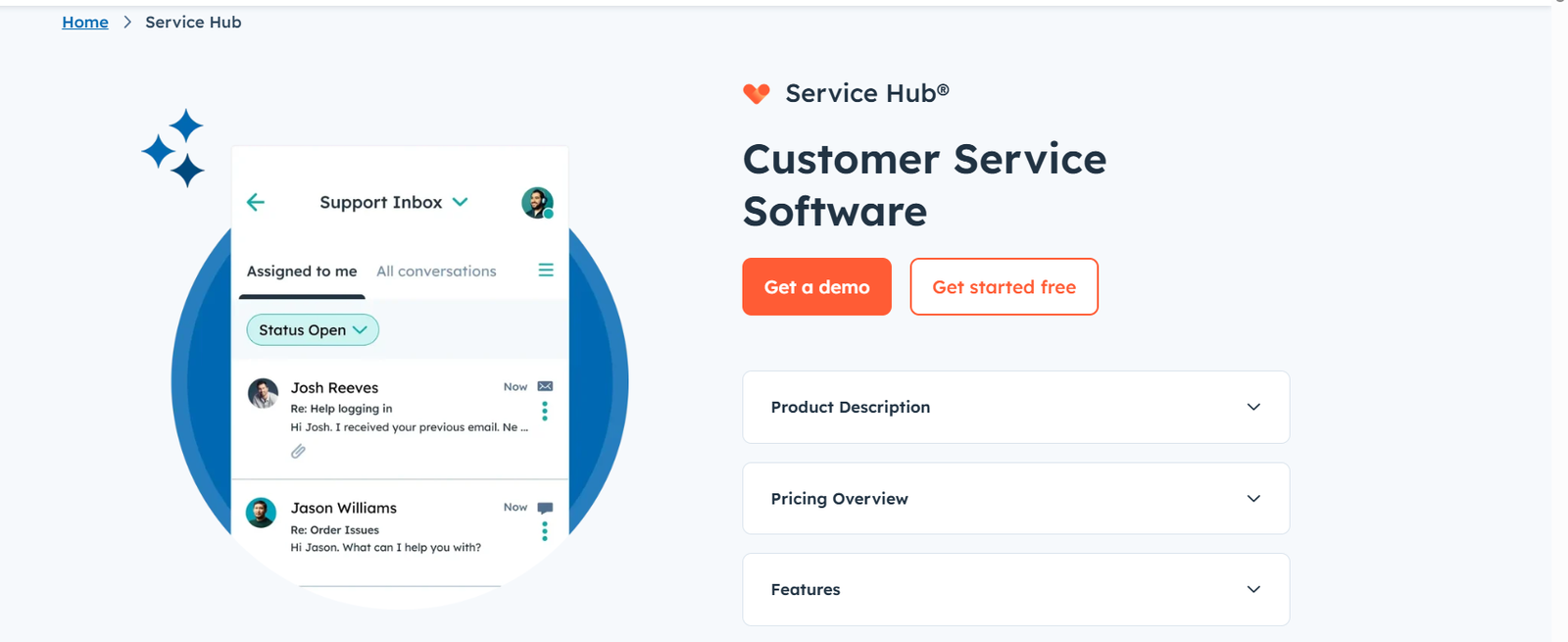
HubSpot offers two pricing tiers tailored to business needs. The Marketing Hub Professional plan starts at $800 per month, including features like social media integration, custom reporting, lead scoring, and marketing automation. The Enterprise plan, at $3,600 per month, adds advanced capabilities such as customer journey analytics, custom objects, and AI-driven insights. Both plans support multi-channel engagement, campaign tracking, and scalable customer interactions. While HubSpot requires one-time onboarding fees ($3,000 for Professional and $7,000 for Enterprise), its extensive integrations, automation tools, and analytics make it a comprehensive solution for ecommerce businesses aiming for long-term customer retention and revenue growth.
Hiver
Hiver is an advanced helpdesk software designed for ecommerce businesses, seamlessly integrating with Gmail to streamline customer support. It enables teams to manage shared inboxes, automate workflows, and assign emails as tasks without leaving their inbox. Features like collision detection, email tags, analytics, and SLA management help support teams collaborate efficiently. Hiver also provides AI-powered email responses, automation rules, and chatbot integration, ensuring faster resolutions. With multi-channel support, knowledge base management, and real-time customer insights, businesses can deliver exceptional service while maintaining operational efficiency.
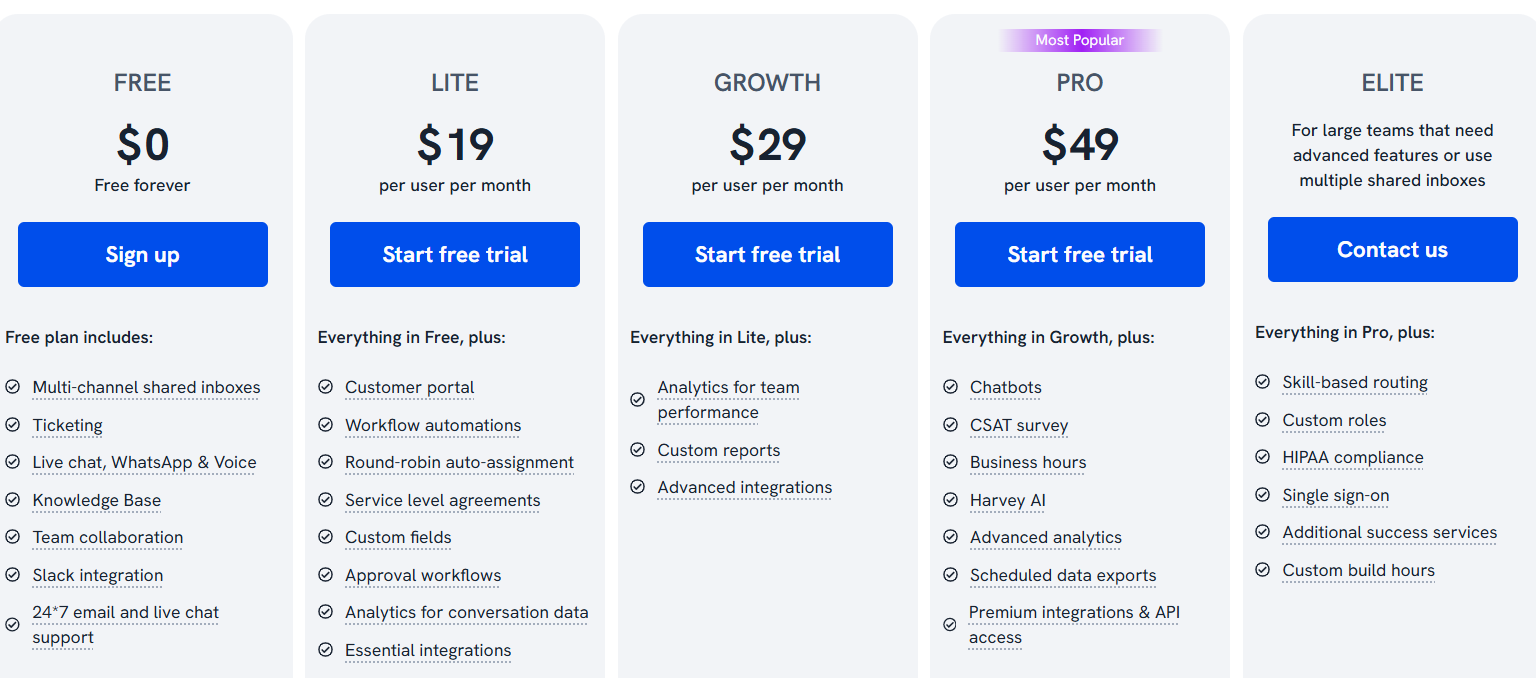
Hiver’s pricing is tailored to different business needs, offering flexible plans based on team size and feature requirements. Starting with affordable per-user pricing, Hiver ensures businesses only pay for what they use. Advanced plans include customizable workflows, analytics, automation, and premium customer support to scale customer service efforts. With a free trial available, ecommerce brands can experience Hiver’s efficiency before committing, making it a valuable investment for improving customer satisfaction and operational productivity.
HelpCrunch
HelpCrunch offers a feature-rich helpdesk solution designed to enhance customer support for ecommerce businesses. It provides multi-channel communication, allowing businesses to manage messenger channels, emails, live chat, and WhatsApp from a unified dashboard. The platform includes chatbot flows, auto messages, popups, and an AI-powered editor to streamline customer interactions. Businesses can benefit from automation tools, advanced customization, and multilingual knowledge base support, ensuring a seamless experience for both customers and support agents. Additionally, the platform allows full customization of widgets and branding removal for a professional appearance.
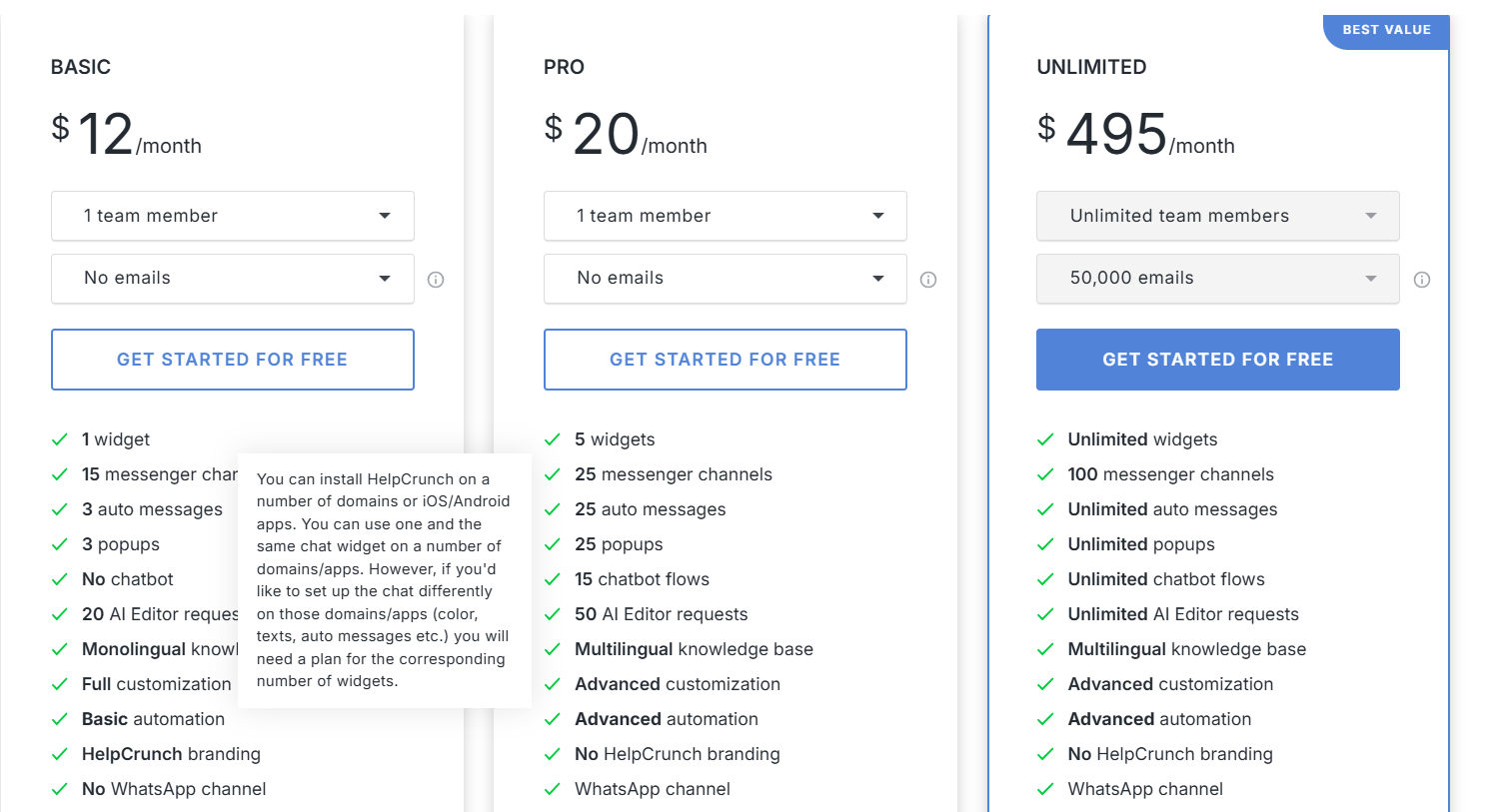
HelpCrunch’s pricing is structured into three tiers to accommodate businesses of different sizes. The Basic plan ($12/month per team member) includes essential features like a monolingual knowledge base, basic automation, and one widget. The Pro plan ($20/month per team member) offers enhanced features, including multilingual knowledge base, advanced automation, WhatsApp integration, and custom roles. For large enterprises, the Unlimited plan ($495/month) provides unlimited team members, emails, chatbots, and automation, making it ideal for businesses with high customer engagement. Each plan offers a free trial so businesses can explore the platform before committing to a subscription.
LiveAgent
LiveAgent is a feature-rich customer support platform designed to enhance communication and streamline customer interactions. It offers essential tools such as ticketing, live chat, a knowledge base, customer portal, and automation rules to ensure efficient support handling. The platform supports multi-language communication, AI-powered chatbot assistance, and various integrations, making it adaptable for businesses of all sizes. Advanced features such as call center and IVR, proactive chat invitations, agent ratings, time tracking, audit logs, and social media integrations (Facebook, Instagram, Twitter, Viber, WhatsApp) provide a comprehensive customer service solution. Additionally, LiveAgent includes SSO, custom roles, service level agreements (SLA), and dedicated account management in its higher-tier plans, catering to enterprises with extensive support needs.
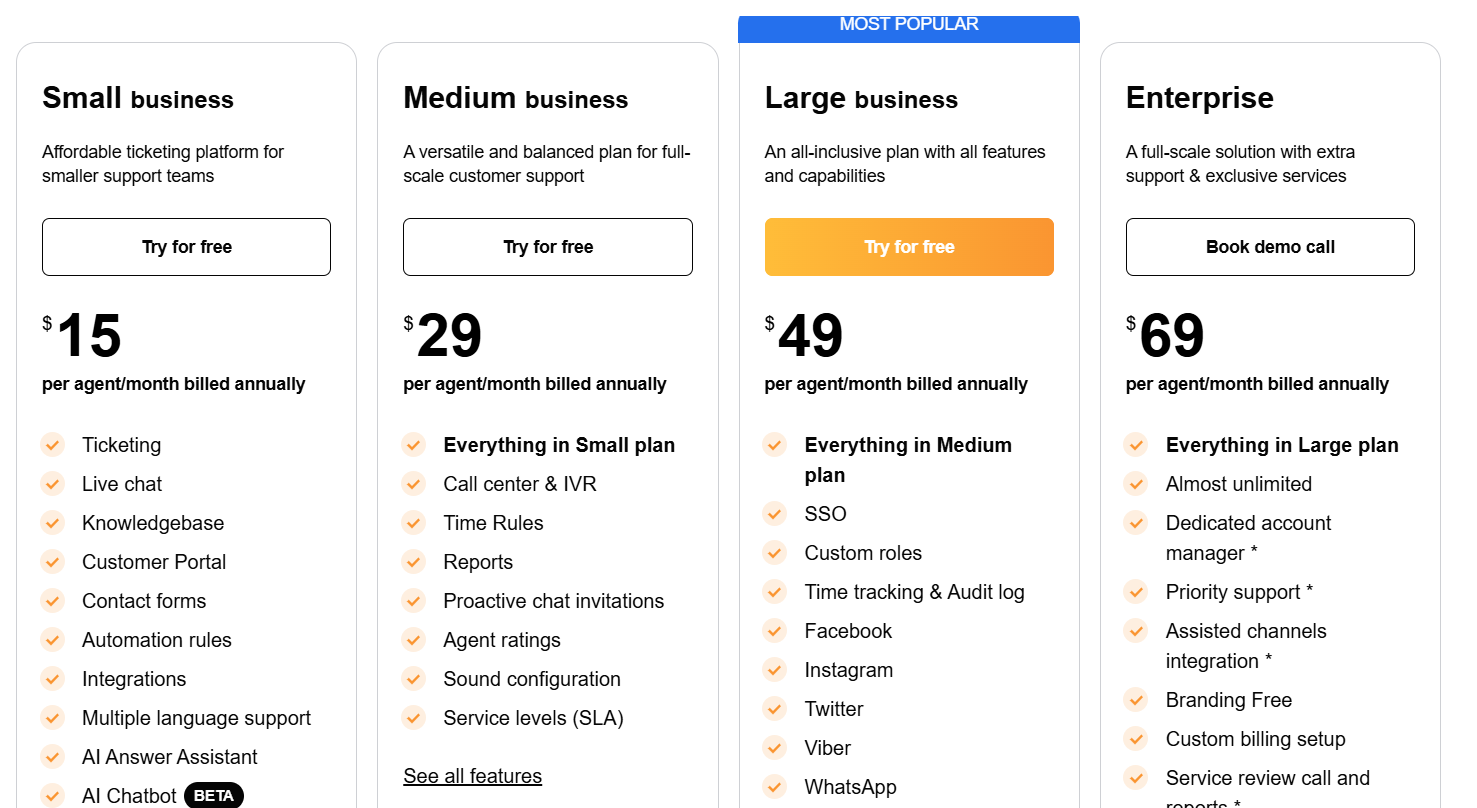
c. The Small Business plan, priced at $15 per agent per month (billed annually), includes fundamental support tools like ticketing, live chat, automation, and AI assistance. The Medium Business plan at $29 per agent per month builds on this by adding call center & IVR support, reports, proactive chat, and SLA management. The Large Business plan, priced at $49 per agent per month, includes everything from the previous tiers plus SSO, custom roles, time tracking, and social media integrations. For organizations needing premium support, the Enterprise plan costs $69 per agent per month and offers almost unlimited features, a dedicated account manager, priority support, branding-free experience, and custom billing setup.
Richpanel
Richpanel is a customer support automation platform designed to streamline customer interactions and reduce ticket volume. It offers AI-powered automation, allowing businesses to handle common queries without human intervention, reducing workload and response times. The platform provides multi-channel support, integrating with email, live chat, social media, and messaging apps to ensure seamless customer communication. Richpanel is built for e-commerce and service-based businesses, featuring self-service portals, advanced analytics, and multi-brand management for companies handling multiple storefronts. Its automation tools and AI capabilities make it a powerful solution for improving customer support efficiency.

Richpanel offers three pricing tiers: Pro, Pro Max, and Enterprise. The Pro plan, at $69 per agent per month (billed annually at $828/year), is ideal for businesses starting out, including AI automation at no extra cost. The Pro Max plan, priced at $99 per agent per month (billed annually at $1,188/year), is designed for businesses managing multiple brands, offering advanced analytics and expanded channel support. The Enterprise plan provides custom pricing for businesses with over 50 agents, featuring custom integrations, premium support, and a white-glove setup tailored to enterprise needs.
Kayako
Kayako is a comprehensive customer support platform designed to enhance ticket resolution through automation and AI-driven features. The Essential plan includes an Advanced Ticketing System, Unlimited AI-Suggested Responses, Knowledge Base Audit, Self-Learning Mode, Multiple Chatbots & Customer Channels, API Access, and Integrations. Businesses can leverage these tools to streamline customer interactions and improve efficiency. The Enterprise plan builds on these features, adding Fully Autonomous Resolutions, Ticket Summaries, Audio File Transcriptions, Multilingual Content, Powerful Reporting, and Customizable Branding (Logo), making it ideal for large-scale customer support operations.
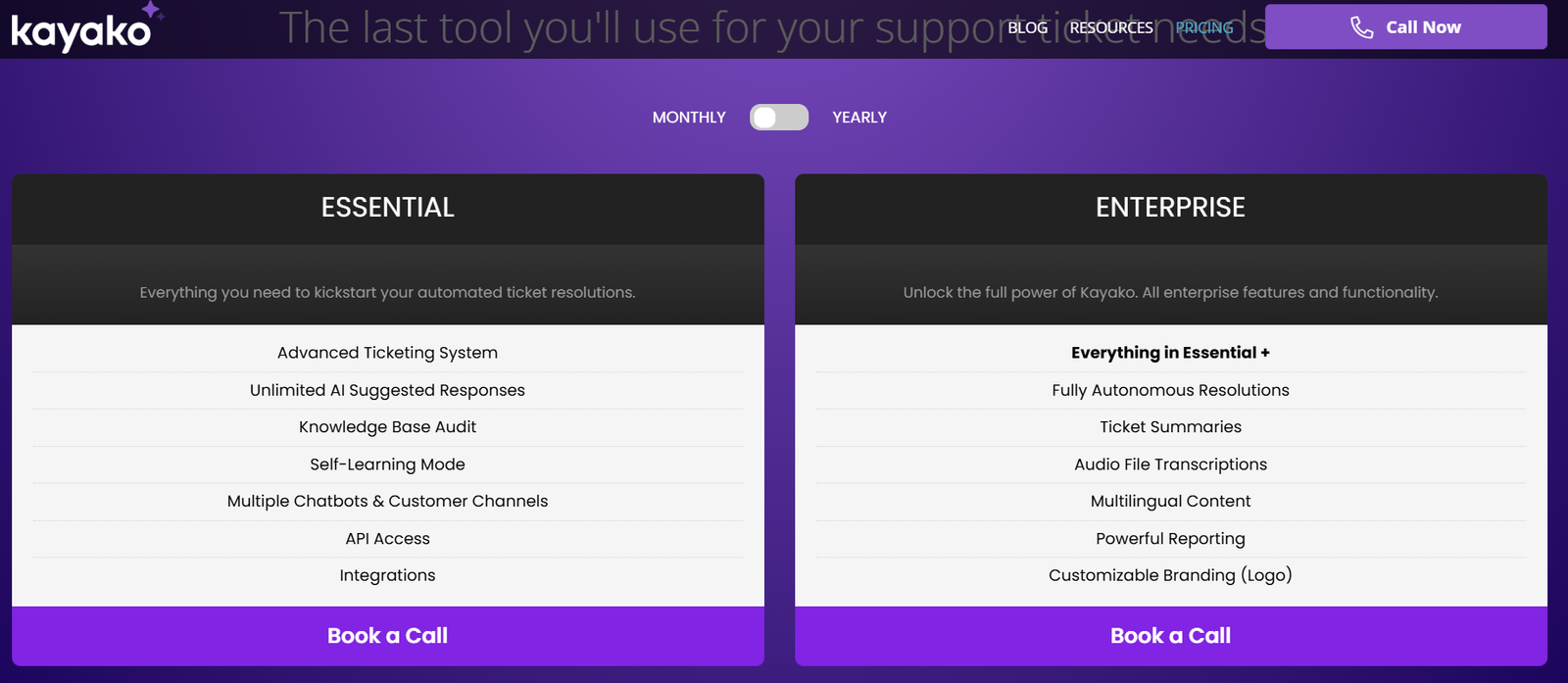
Kayako’s pricing structure is not explicitly stated on the website, but it offers two tiers: Essential and Enterprise. The Essential plan is designed for businesses that require a strong foundation in automated ticket resolution, providing AI-powered responses and chatbot integration. The Enterprise plan, which includes advanced automation and multilingual capabilities, is suited for businesses with higher customer support demands. Since pricing is not displayed upfront, interested businesses must book a call to discuss custom pricing and tailored solutions based on their needs.
Helpshift
Helpshift is an AI-powered customer service platform designed to streamline support operations through automation and issue-based pricing. It provides AI Agents and Automation to significantly reduce support volume by handling routine inquiries and assisting human agents in resolving issues efficiently. The platform includes unlimited agent seats and messaging, ensuring seamless communication. Helpshift also features real-time operations management, team collaboration tools, and global AI-enhanced support, making it suitable for businesses of all sizes. Its advanced security, customization options, and integration capabilities enable organizations to scale and optimize their customer service processes effectively.

Helpshift’s pricing model is structured into three tiers: Starter, Growth, and Enterprise. The Starter plan, ideal for small teams and startups, begins at $150 per month, offering AI-powered support essentials with 250 free issues per month. The Growth and Enterprise plans are designed for medium to large-scale businesses, providing advanced AI, automation, and enhanced customization. These plans come with custom pricing, requiring businesses to request a quote based on their specific needs. Helpshift’s issue-based pricing model ensures cost efficiency by charging based on the number of resolved issues rather than the number of agents, making it a scalable solution for businesses looking to optimize their customer service operations.
Groove
Groove offers a comprehensive customer support platform with three subscription tiers: Standard, Plus, and Pro. The Standard plan includes essential features like two shared inboxes, email management & ticketing, unlimited help widgets, and API & webhook access, along with mobile app support and standard reporting. The Plus plan enhances functionality by offering five shared inboxes, two knowledge base sites, advanced automation, SLA management, and AI-powered tools like AI summarization, AI sentiment analysis, and AI writing assistance. The Pro plan is designed for large-scale operations, providing 25 shared inboxes, five knowledge base sites, enterprise security, advanced API access, and a dedicated account manager, making it ideal for businesses with high-volume customer interactions.
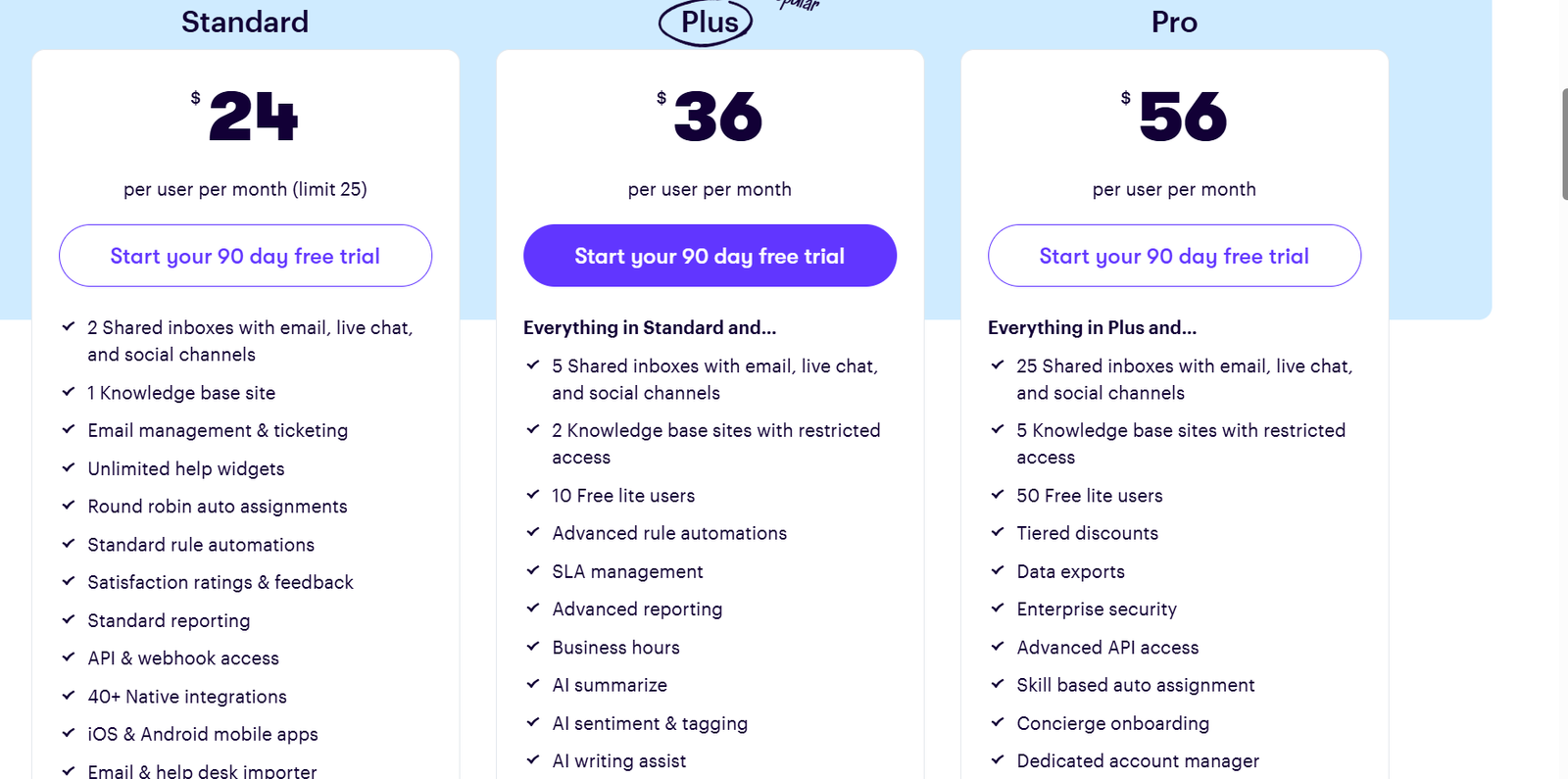
Groove’s pricing structure is based on a per-user monthly subscription. The Standard plan costs $24 per user per month (with a limit of 25 users), making it suitable for small teams. The Plus plan, priced at $36 per user per month, is the most popular option, offering additional AI features and automation capabilities. The Pro plan, at $56 per user per month, is geared towards larger teams and enterprises needing advanced security, API access, and premium support services. All plans come with a 90-day free trial, allowing businesses to explore the platform’s features before committing.
Tidio
Tidio offers four pricing plans, each catering to different business needs with varying features. The Starter plan is ideal for small businesses and includes 100 handled conversations, basic analytics, live visitor tracking, operating hours management, and live chat support for $29 per month. The Growth plan, which is the most popular, expands on this by offering 800 handled conversations, advanced analytics, Tidio power features, no Tidio branding (as an add-on), and permissions control for $159 per month. The Plus plan, starting at $749 per month, includes everything in Growth plus custom quotas for handled conversations, a dedicated success manager, custom branding, multisite and department support, multilingual capabilities, and OpenAPI access. Lastly, the Premium plan, starting at $2,999 per month, offers unlimited handled conversations, a 50% guaranteed Lyro AI resolution rate, priority support, super admin roles, advanced monitoring and analysis, and Lyro as a managed service, making it ideal for large enterprises.
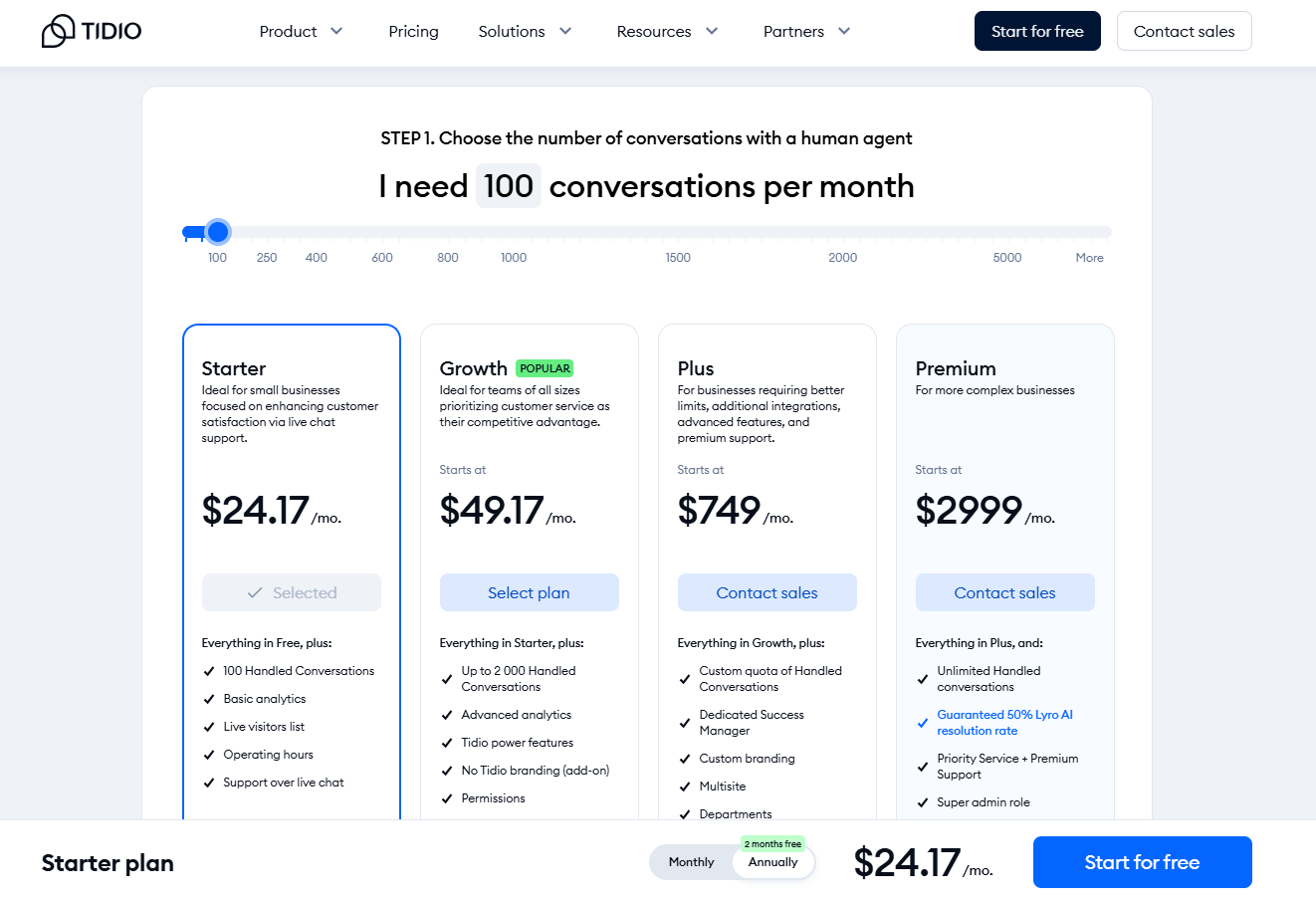
In terms of pricing, Tidio follows a tiered subscription model based on conversation volume and advanced feature access. The Starter plan is the most affordable at $29 per month, catering to small businesses with basic customer support needs. The Growth plan, priced at $159 per month, is designed for businesses that prioritize customer service as a competitive advantage. The Plus plan starts at $749 per month, offering custom quotas and additional integrations suited for growing businesses. For large-scale enterprises with high support demands, the Premium plan starts at $2,999 per month, providing unlimited handled conversations and enterprise-level AI-powered support. Users can choose between monthly or annual billing, with annual plans offering two months free.
HappyFox
HappyFox offers four pricing tiers with features catering to different business needs. The Basic plan, priced at $21 per agent per month, includes essential features like unlimited tickets, omnichannel ticket creation, SLA management, a knowledge base, and SSO (GSuite/SAML/Azure), supporting up to five agents. The Team plan, at $39 per agent per month, extends functionality by adding multi-brand helpdesk support, custom email and domain, custom roles and permissions, custom ticket queues, 24/5 email support, and an optional EU data center. The Pro plan, the most popular at $89 per agent per month, builds upon the Team plan with proactive agent collision, task and asset management, scheduled tickets, IP-based restriction, load-balanced ticket assignment, password policy management, and 24/7 email support. For large enterprises, the Enterprise PRO plan offers all Pro features plus agent scripting, 2TB attachment storage, all-time reporting history, advanced audit logs, 24/7 phone support, and a customer success manager, with pricing available upon request.

In terms of pricing, HappyFox follows a per-agent subscription model, ensuring scalability for different team sizes. The Basic plan, at $21 per agent per month, is ideal for small teams managing ticketing workflows. The Team plan, priced at $39 per agent per month, introduces multi-brand helpdesk support and additional customization, making it suitable for mid-sized businesses. The Pro plan, at $89 per agent per month, is designed for businesses needing automation and advanced management features. For organizations with extensive customer support needs, the Enterprise PRO plan provides custom solutions, requiring direct contact with sales for pricing. Each plan offers incremental improvements, allowing businesses to scale based on their operational needs.
UVdesk
UVdesk offers three distinct plans catering to different business needs, each with varying levels of features. The Open Source plan is a free, self-hosted solution that includes essential helpdesk functionalities such as security settings, workflow automation, company settings, and theme customization, making it ideal for businesses that want full control over their helpdesk system. The Pro plan is designed for medium-scale industries and comes with eCommerce multi-channel integration and agent performance tracking, ensuring seamless customer support management. For large-scale enterprises, the Enterprise plan provides full portal customization, unlimited mailboxes, unlimited knowledge base access, and advanced feature requests, offering a comprehensive solution for complex customer service needs.
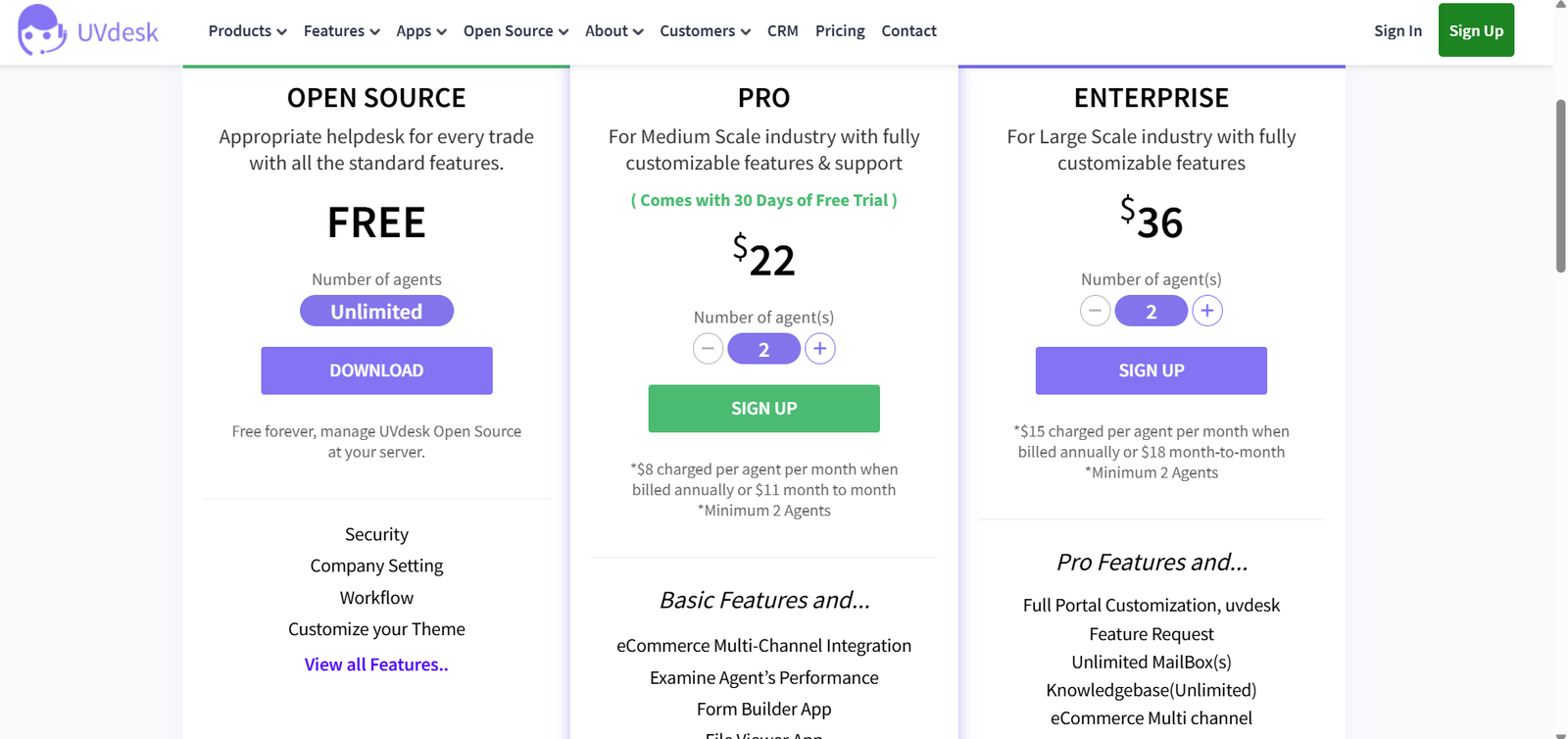
In terms of pricing, the Open Source plan is completely free and allows unlimited agents, making it a cost-effective choice for businesses that can manage their own servers. The Pro plan costs $22 for two agents (equivalent to $8 per agent per month when billed annually or $11 on a monthly basis) and includes a 30-day free trial. The Enterprise plan is priced at $36 for two agents, with a per-agent charge of $15 per month when billed annually or $18 per month when paid monthly, ensuring flexibility for larger teams. Both paid plans require a minimum of two agents and offer scalable options for growing businesses.
Desk.com
Salesforce’s Small Business CRM solutions provide two distinct plans tailored to different business needs. The Starter Suite is designed as a simple CRM suite that integrates marketing, sales, service, and commerce tools. It includes essential features such as dynamic email marketing and analytics, out-of-the-box sales processes, seamless customer service, and a simplified storefront builder, making it ideal for small and growing businesses. The Pro Suite, on the other hand, is a more flexible CRM solution with enhanced features, including real-time chat, greater customization and automation, sales quoting and forecasting, and access to AppExchange, allowing businesses to scale efficiently with advanced tools.
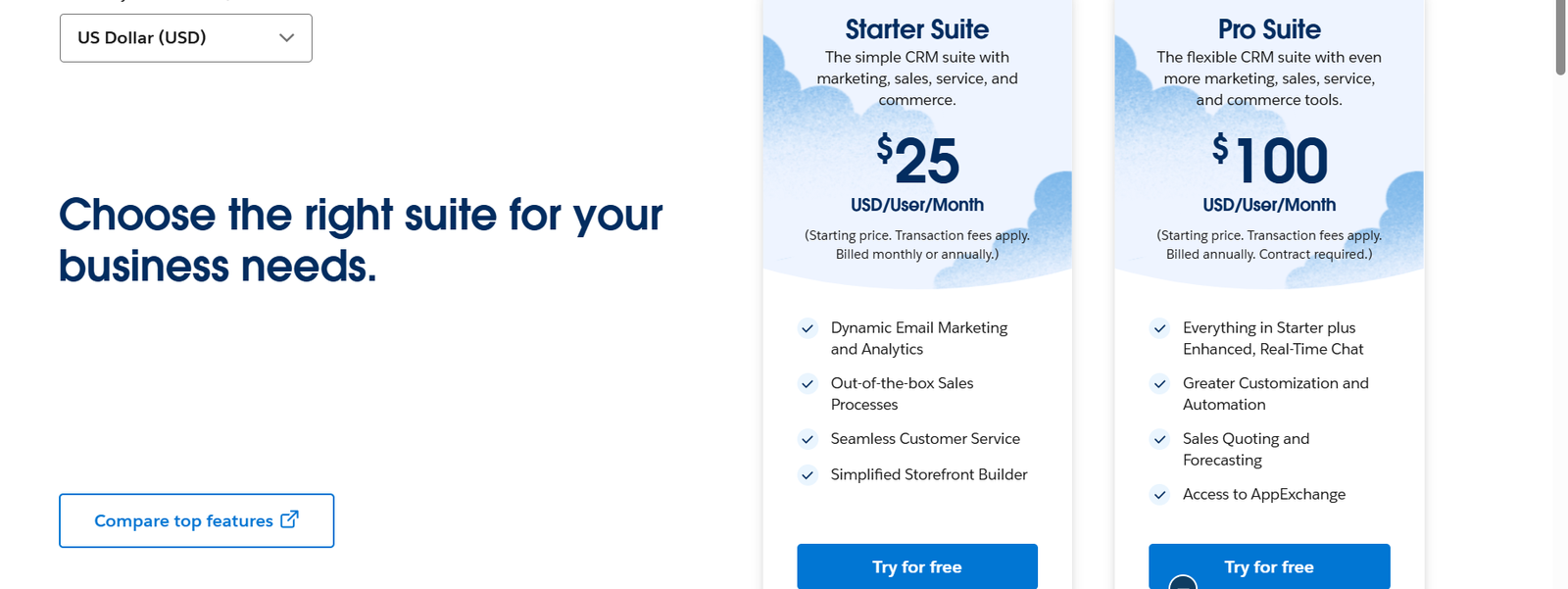
In terms of pricing, the Starter Suite is available at $25 per user per month, with billing options available on both a monthly and annual basis. This plan provides a cost-effective solution for businesses looking to streamline operations. The Pro Suite is priced at $100 per user per month and is billed annually, requiring a contract. This plan is better suited for businesses that require advanced automation, forecasting, and integrations to optimize their customer relationship management. Both plans come with a free trial option, allowing businesses to explore the features before committing.
Key Features of Ecommerce Helpdesk Software
Ecommerce helpdesk software enhances customer support by offering a ticketing system and issue tracking, enabling support agents to efficiently manage and resolve customer inquiries from a centralized platform. This ensures that every support request is properly tracked, preventing issues from being overlooked. Additionally, automated quick responses and workflows streamline customer service operations by reducing response times and improving efficiency, allowing businesses to handle high volumes of queries without compromising quality.
With 24/7 virtual assistance and AI-powered chatbots, businesses can provide round-the-clock support, ensuring customers receive immediate help regardless of time zones. A unified inbox further simplifies support management by consolidating interactions from multiple channels, such as email, live chat, and social media, into a single interface. Lastly, prioritized customer support and SLA management help ensure critical issues are addressed promptly, improving customer satisfaction and maintaining service-level agreements (SLAs) for timely resolutions. These features collectively enhance the overall efficiency, responsiveness, and reliability of ecommerce customer support.
Best Practices for Ecommerce Customer Support
A well-structured help center is essential for providing customers with quick access to support resources, FAQs, and self-service options. By offering a centralized knowledge base, businesses can empower customers to find solutions independently, reducing the need for direct support interactions while enhancing the overall shopping experience. Additionally, ensuring customer support is accessible and responsive across multiple channels—such as live chat, email, and social media—helps build trust and improves customer satisfaction.
Leveraging eCommerce helpdesk software can significantly improve efficiency by automating workflows, managing inquiries, and providing instant responses through AI-powered chatbots and automated ticketing systems. This not only streamlines support operations but also allows support teams to focus on resolving complex issues. Ultimately, using the best help desk software enhances customer satisfaction and fosters brand loyalty by ensuring timely and personalized support, leading to a seamless and positive customer experience.
Conclusion
Choosing the right eCommerce helpdesk software is crucial for delivering exceptional customer support and ensuring seamless business operations. Salesforce’s Starter Suite and Pro Suite cater to businesses of different sizes, providing essential tools for managing customer interactions, automating processes, and enhancing sales and marketing efforts. While the Starter Suite is a cost-effective solution with fundamental CRM capabilities, the Pro Suite offers advanced customization, real-time chat, and forecasting tools for businesses looking to scale. By selecting the right plan, businesses can improve customer engagement, streamline support operations, and drive long-term growth.
